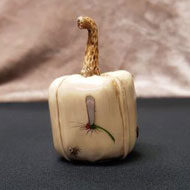
Born Free believes illegal ivory is slipping through the net
Conservation charity the Born Free Foundation is warning that newly-carved ivory items from recently slaughtered elephants are being passed off as antiques, allowing them to be sold without an official certificate.
International trade in ‘new ivory’ is illegal but items manufactured before 1947 can be legally traded.
A capsicum carved out of solid ivory was confiscated from an antiques fair at Alexandra Palace in London last year. Born Free’s president Will Travers says that seven reputable auction houses agreed to offer it for sale on the basis that it was manufactured before 1947.
However, the charity organised carbon-dating of the item by an Oxford University lab, which revealed there was a 95.4 per cent probability that the ivory had been taken from an elephant between 1957 and 2004, and an 85.9 per cent probability that it was taken after 2001.
Mr Travers said: “While this is just one item, we believe that many thousands of similar objects are flooding in and out of, and circulating within, the UK, fuelling the continued slaughter of elephants by poachers.”
He added: “We do not believe that dealers are able to accurately establish the age or provenance of ivory items by eye. If we are to bring the slaughter of elephants to an end, the trade in ivory items must stop, and any exemptions must be minimal and easily verified.
“As the world’s largest legal exporter of ivory, and in the lead-up to next year’s Illegal Wildlife Trade summit in London, hosted by the British government, the UK is in a strong position to make a clear statement that it values live elephants over and above commercial trade in antiques and trinkets.”
The UK Government is currently consulting on proposals to introduce an ivory trade ban.
Image courtesy of the Born Free Foundation



 The Veterinary Medicines Directorate (VMD) is inviting applications from veterinary students to attend a one-week extramural studies (EMS) placement in July 2026.
The Veterinary Medicines Directorate (VMD) is inviting applications from veterinary students to attend a one-week extramural studies (EMS) placement in July 2026.